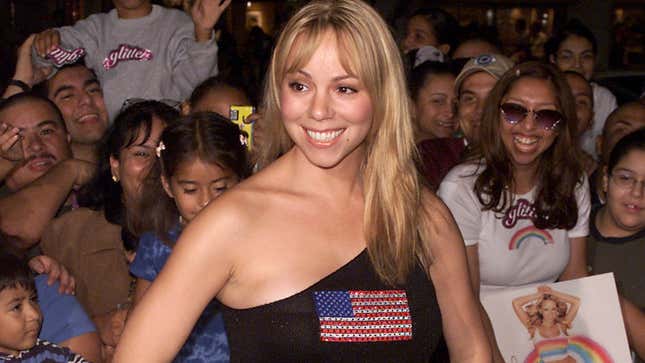A Brief History of Mariah Carey Blaming Glitter‘s Failure on 9/11
"Anything released the week of 9/11/2001 was not going to work," she claimed. Wrong!
EntertainmentMusic

The 2001 movie that was supposed to catapult Mariah Carey into film stardom, Glitter, is known as one of the most notorious cinematic flops of all time. It did have audiences cheering, albeit not for the intended reasons. The shot that elicited applause, according to multiple write-ups at the time of its release, was of the fully intact Twin Towers, which had been leveled just 10 days before Glitter thudded into the theaters.
Glitter and 9/11 would remain inextricably linked moving forward, but for reasons beyond a stray glimpse of the New York skyline as it once was. For years, Carey has used the unfortunate timing to explain away her project’s failure. The album had originally been planned for an August 21 release (with the film teed up for August 31), but both had been pushed back three weeks after Carey’s very public battle with exhaustion while promoting the project had landed her in the hospital. It wasn’t supposed to happen this way.
If things went according to plan, Glitter might have been an afterthought by the time 9/11 rolled around. The buzz had been bad all summer and the first single, “Loverboy,” had received a tepid response at radio. The high-profile project should have simply been written off as Carey’s first commercial failure after an unstoppable string of successes in the preceding decade.
Instead, 9/11 bore Carey’s blame for a misbegotten project for years in its wake. Sometimes she botched her already dubious recounting of events, like when she claimed the movie was released on 9/11 during a 2013 Watch What Happens Live interview:
The timing of Glitter trumped its content in Carey’s recollection. She told the New York Times in 2005 when promoting her comeback album, The Emancipation of Mimi, “I don’t care if it was the best one of my life, anything released the week of 9/11/2001 was not going to work.” But that’s not true—other new album releases on that day included Jay Z’s classic album The Blueprint and Nickelback’s …less-than-classic album Silver Side Up. (They were certified two and six times platinum, respectively.)
-

-

-

-

-

-

-

-

-

-

-

-

-

-

-

-

-

-

-

-

-

-

-

-

-

-

-

-

-

-

-

-

-

-

-

-

-

-

-

-








































